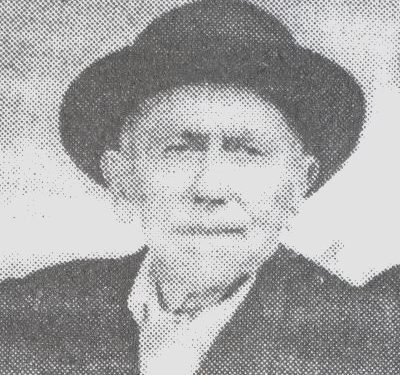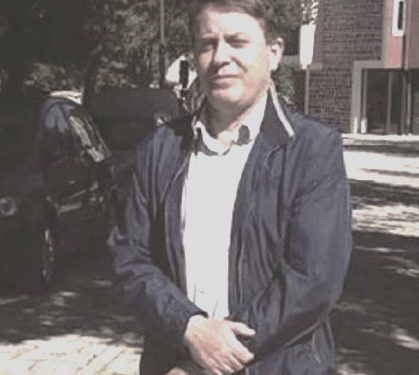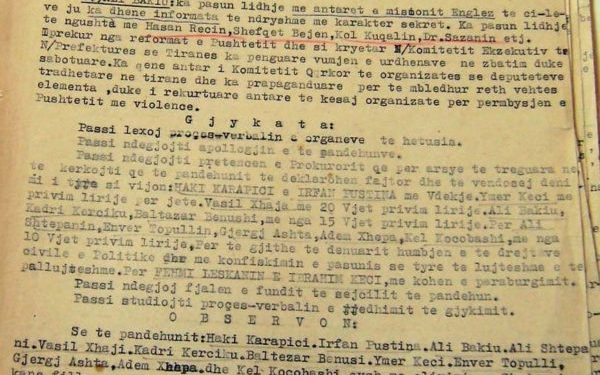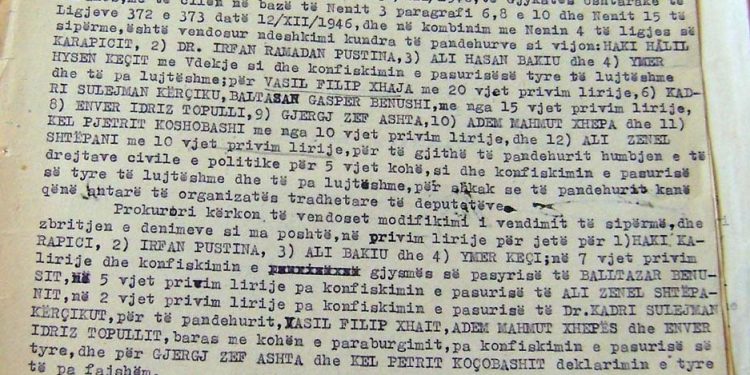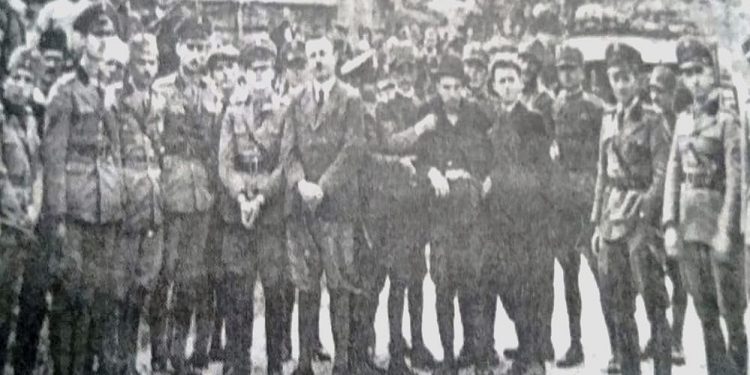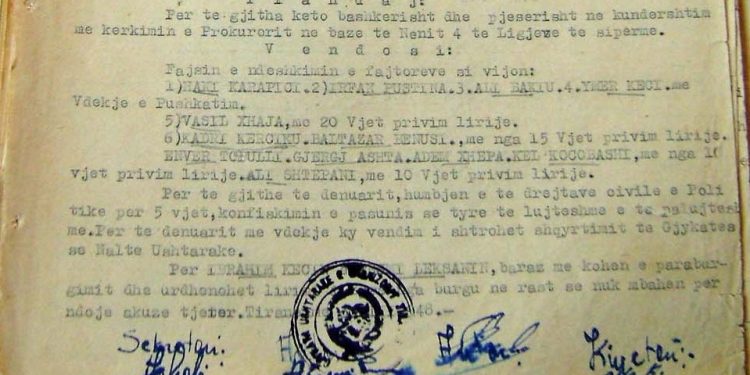By Luan Shtëpani
Memorie.al / Exactly 78 years ago, in May 1947, the deputies were arrested, along with a group of intellectuals and property owners. While on September 5, 1947, the “Trial of Deputies” took place in the former “November 17” Cinema in Tirana. In the same former “November 17” Cinema, just a few months after the “Trial of Deputies”, another trial would take place. The trials have been written and commented on at length, regardless of viewpoints. For the sake of transparency and documented truth, intentionally or unintentionally, many personalities have been overlooked, who, although innocent, suffered in prisons since the first hours of freedom.
This is what happened with Ali Shtëpani. On May 16, 1947, Ali Shtëpani would be arrested suddenly and sensationally. The charges against him would be very serious. The Military Prosecutor’s Office of the Tirana Garrison accused him of; “in the position of Deputy Chairman of the District Committee of traitor deputies for Tirana, he worked in his district against the popular power. He was in connection with the escaped war criminals, to whom he also provided financial assistance from the Committee”. This accusation, as it would later turn out, was untrue and malicious. On February 18, 1948, at 11.30 am, Ali would be questioned for an hour by the investigator. He would answer the provocative questions accurately and firmly, telling the truth and only the truth.
The investigator’s questions for Ali Shtëpani
Question: Have you ever been to Shefqet Beja’s (house)?
Answer: Yes, I have been once, when his mother died.
Question: Who were you with and what did you talk about?
Answer: I don’t know who I was with and we didn’t talk, we just consoled him.
Question: Has Irafan Majuni ever been to your house?
Answer: Yes, it was in 1945 and he asked me for a beehive, but I told him that he doesn’t come on horseback, from Shëngjergji and here.
Question: Have you talked to Irfan before?
Answer: Yes, when we went to Berat, when the government called us, I went with him.
Question: Do you know Selaudin Toto and what did you talk about?
Answer: Yes, I know him well. He was at the Front, I used to go there even though I was on leave. Once I was at his house to console him when his cousin died in Prishtina.
Question: What did you talk about with Selaudin Toto and Kostë Boshnjaku, on Rruga “28 nëntotori”?
Answer: I met them on the way, we went into a pastry shop, we stayed for about 10 minutes and we talked about the issue of weapons, which they said it would be better to hand over, because whoever needs them, the Government gives them. We had this conversation at the end of 1946, or April 1947.
Question: How many times had you met with Kostë Boshnjaku before and what did you talk about?
Answer: I met him often, he came to my place for parties and I went to his, we only talked about family matters.
Question: What about Ramazan Tabaku, what kind of relationship did you have?
Answer: I went to see him in Durrës in 1945, when he opened his son’s funeral. I was there to console him; I didn’t have anything else to do.
Question: Where do you know Colonel Kuqali and what kind of relationship did you have with him?
Answer: I saw him when he was a deputy, when I went there, I didn’t talk to him at all.
Question: What did you talk about with the above-mentioned people, against the government?
Answer: I didn’t talk, because they never talked to me…..!
Question: Did Shefqeti talk to you against the government?
Answer: Never……..!
March 23, 1948, for Ali Shtëpani and the other defendants, would be the day of trial. The court in its indictment would state that; the defendants, since the liberation of Albania, have begun their activity against the popular power. They have agitated and propagated against the popular power, being in contact from the beginning with Shefqet Beja etc. At first, they tried to sabotage the elections of December 2. In July 1945, they formed the Regional Committee for Tirana, where Shefqet Beja gave them the directives of the Central Committee of the traitorous organization of deputies”. It is further stated that; “they divided the work according to their capacities and the sectors of work for each”. According to the court, Aliu would work with the villagers and the escaped criminals.
“The first task of the defendants was to sabotage the elections of December 2, to create chances and incidents to show the outside world that the elections were not free and to make it possible for foreigners and Anglo-American reaction to intervene, in order to overthrow the popular power by force and take the reins of the state into their own hands. In 1946, the defendants decided at their meeting to carry out local uprisings through criminal gangs, to find a pretext for Anglo-American reaction to intervene and change the situation. The defendants had full knowledge of the September 9th movement that took place in Shkodra, which was a supportive hope for internal reaction and for Anglo-American intervention. With the arrest of Shefqet Beja, connection with the Central Committee through Kostë Boshnjakut”.
Ali Shtëpani (always according to the trial panel) states that he had fallen into contact with the escaped criminals, had talked with kulak villagers and that he had received 5000 Fr. from the Central Committee and had handed it over to Osman Mema. At the trial, Aliu would state that the accusations against him were untrue and that he had not had any connection with anyone. Convinced of his innocence, he would declare before the trial panel that if anyone came forward to say the opposite, he would accept the accusation made against him. And yet, the situation would become even more difficult for Aliu who would face the well-instructed witness in court, to make it credible that he had been active in overthrowing the popular power.
The witness would declare that Ali Shtëpani had participated in a meeting at Shefqet’s house Beja and that meetings were held at his house on “Elbasani Street”, indicating that it was on the left side, without specifying it exactly, with the excuse that it was at night, which shows that the statements were untrue, that is, imposed by others. Faced with these baseless accusations, Aliu would calmly claim that his house was indeed on “Elbasani Street”, but that it was not true that meetings were held there.
The evidence would fall very quickly, due to the fact that other defendants would declare that they had not participated in any meetings at Aliu’s house, where there were some who claimed that they had no idea where his house was. As for the meetings at Shefqet Beja’s house, Aliu would claim that he had only visited his house once, when his mother had died. As you research what has been written and from the testimonies of the other defendants, you are convinced from the beginning that the sentences would also be serious.
The decision of the Military Court
The Military Court of Tirana, based on article 3, paragraph 6,8,10 and article 15 of laws 372 and 373, dated 12.XII.1946, judgment act no. 212 dated 30 March 1948, decided to sentence Ali Shtëpani to 10 years of imprisonment, while 4 people were given death sentences, the others to 20 and 15 years. For all the convicted, loss of civil and political rights for 5 years, confiscation of their movable and immovable property.
By death, shooting, of citizens: Haki Karapici, Irfan Pustina, Ali Bakiu, Ymer Keçi.
With 20 years of imprisonment: Vasil Xhaji.
With 15 years of imprisonment: Kadri Kërçiku, Baltazar Benusi.
With 10 years in prison: Ali Shtëpani, Enver Topulli, Gjergj Ashta, Adem Xhepa, Kel Koçobashi.
Aliu would say that when the jury was leaving, when confronting the witness (and the arrested one), he would learn the truth, but not the organizer, although he had understood something.
“Why are you accusing me, I have never met you. You were not able to answer my questions, where the house and the room where the meeting was, its windows, etc. were” – I told the witness. He was touched by my approach, took a cigarette in his trembling hands, and addressed the prisoners: listen, I took revenge on this man, but you should know, I carried out the order. I could not have acted differently, etc.” If that were the case, I have forgiven you, Aliu had said, who would appeal to the Supreme Court to review the absurd decision of the Tirana Military Court. He is requesting a reduction in the sentence, due to his advanced age, while at the same time showing that he had never acted against the people’s government in any way or under any circumstances.
Decision of the Supreme Military Court
The Supreme Military Court reviewed the Tirana court’s judgment. According to the document, for those sentenced to death, the sentence was given for life imprisonment, while for the others, the sentence was reduced by 5 years, including Aliu. The convicts were also acquitted, and the measure for confiscation of property was also changed.
Life imprisonment: Haki Karapici, Irfan Pustina, Ali Bakiu, Ymer Keçi.
7 years imprisonment: Baltazar Benusi
5 years imprisonment: Ali Shtëpani
With 2 years of imprisonment: Kadri Kërçiku
With detention completed: Vasil Xhaji, Adem Xhepa, Enver Topulli
Not guilty: Gjergj Ashta, Kel Koçobashi
Only the confiscation of the property of those sentenced to life imprisonment remained in force. This decision is dated April 21, 1948. The Prison Directorate is also notified of this decision, “Enemies of the People”
Who was Ali Shtëpani?
Ali Shtëpani, an honored figure in Tirana and beyond, together with other members of his family, would be protagonists of many great events for the country. The Shtëpani family would contribute to the great uprising against the Turkish invaders, to later continue with the beginnings of the first Albanian school in the Tirana district, in this family. Loyal to the Vlora government and supportive of the Lushnja government. Strong supporter of Noli and resistance to the Kingdom, which cost them dearly. Freedom for the Shtepani would be a sacrifice to fight foreign invaders. In the large Shtepani house, in Shëngjergj in Tirana, the General Headquarters of the National Liberation Army stayed for days and nights.
Ali Shtepani, a member of the General National Liberation Council elected by the Përmet Congress, led all the family members for freedom. At that time, the British recognized the Shtepani family as one of the most important families in Central Albania. The former member of the English mission in Albania, David Smajli, writes: “… There are three families, unshakable for freedom, that constitute a great triangle of the Albanian anti-fascist and freedom-loving spirit: And these are the Peza family, the Xhani family from Luzi i Madh in Kavaja, but who rightfully took the surname Martaneshi, and the Shtepani family, from Shëngjergji…”!
The liberation of the country would be enthusiastically welcomed by the Shtëpani family. But not everything would go according to plan, because people with undeserved positions demanded at all costs that Ali Shtëpani be behind bars, even though he had done nothing, because only in this way would his family lower their heads, despite the fact that they had not demonstrated any self-respect for what they did during the War.
Here is the CIA report on Ali Shtëpani
According to reports made to the CIA, details have been revealed about several people who were imprisoned in 1947 in Albania. About Ali Shtepani, among other things, it was said: “Ali Shtepani, born in Shëngjergj. Like Ali Aga, he also had influence in Çermenika, Elbasan and generally in Central Albania. His large and strong tribe was the main support of the communists in Central Albania, where the Bajraktar element was against the communists. During the War, he had been a member of the General Council of the National Liberation Front. In 1947, he was sentenced to imprisonment…”!
After leaving prison, convinced of his innocence, Ali would not surrender. Now in completely different conditions and circumstances, the case would be reviewed, where he would ultimately be acquitted, although he was unjustly imprisoned and at an advanced age. Much has been written and commented on the extraordinary contribution of Ali and his family to the fight for freedom and independence. In the publications of the time (including those of the leadership), superlatives would be written about the patriot Ali Shtëpani, who with courage, wisdom and intelligence knew how to face the challenges of the time. Memorie.al




